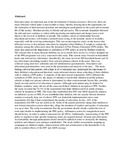| dc.description.abstract | Education plays an important part in the development of human resources. However, there are many obstacles which make it inaccessible to many, thereby denying them the opportunity for the realization of their personal potential and meaningful participation in the social and economic life of the society. Absolute poverty is chronic and pervasive. The economic disparities between the rich and poor continue to widen while increasing unemployment and hunger pose a real threat to the survival of millions of people. The complex nature of relationship between education and society will remain a research issue owing to the dynamic nature of societies, especially with the evolving technologies.
This was an investigative study on the factors that influence access to free primary education by marginal urban children. It sought to explain the situation among the urban poor since the inception of Free Primary Education (FPE) policy. The study also analyzed the importance or usefulness of FPE policy as seen by Mathare residents. The concern that so many Kenyan children are yet to enroll; have access to; or have dropped out of the FPE progamme was a key concern for this study. The current study focused on household heads and selected key informants. Specifically, the study involved 200 household heads and 10 key informants (including teachers from selected primary schools in the area). Data was collected using interview schedules and self administered questionnaires. Descriptive and inferential generalizations were used in the presentation and analysis of the data .
. The study findings showed that parents with a high level of education may understand the importance of their children's education and therefore, make informed choices about schooling of their children with or without a FPE policy. A majority of the interviewed respondents (68%) affirmed the usefulness of FPE, however, the choice of whether to enroll their children in public primary schools or high cost private schools is determined by other socioeconomic factors like; monthly family income and level of education of parents. Although such options may be limited for Mathare residents, many did not all the same enroll their children at inception of FPE.
Further, the study revealed that 51.5% of the respondents had their children enroll in public primary schools at inception of FPE. The study also established that HIV and AIDS negatively impacts on children's access to FPE. It was established that children who are usually chronic absentee students eventually drop out of school. FPE was limited in implementation since some respondents felt that it had compromised the quality of education. In fact, 18% of the respondents felt FPE was not useful at all. Some of the parents preferred taking their children to non-formal education system where they allege the attention of teachers and quality of education was up to date.
The study recommends that the government should clearly explain the role of each stake-holder in implementing the FPE policy; Affirmative action for marginalized areas should be key, in order to achieve education for all (EFA). Additionally, restructuring of the FPE policy is required so that specific budgetary items are targeted instead. of lump sum allocations. Accountability through participation model should be upheld in order to demystify the funding problem and enhance trust amongst stakeholders. The study further recommends stepping up campaigns on children's rights, empowerment skills and sensitization of the households to be able to combat effects of the HIV and AIDS scourge. | en_US |

